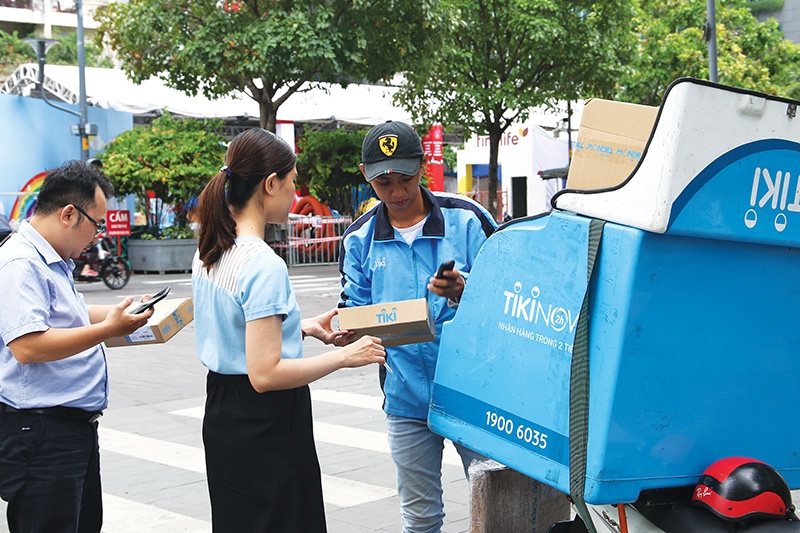Precise policy desired for e-commerce boom
 |
| The currently drafted amendments to Decree 52 are to clarify responsibilites of e-commerce platforms, photo Le Toan |
Nguyen Thai An, a 29-year-old officer in Ba Dinh district of Hanoi, recently bought an H&M cardigan from a US dealer through Shopee during a sale. At outlets in Vietnam, it was on sale for VND700,000 ($30) but the dealer sold it for only VND200,000 ($8.70).
However, An received the item in the wrong size. “I repeatedly asked for an exchange or compensation but failed to get one anything,” An told VIR. “In fact, the actual price I paid for it exceeded the original outlet price when large taxes and logistic costs for overseas transportation were added.”
The outstanding growth of e-commerce in Vietnam has led to a lack of quality in online shopping experiences, especially for those like An who purchase goods from overseas. Due to the hoops having to be jumped through, purchasers of shoddy goods are unlikely to claim compensation from foreign vendors for receiving wrong orders, and mostly accept to lose money or try to sell the faulty items on at severely low prices.
Pham Lan Nhi, an import dealer living in Japan, told VIR that along with receiving wrong items, consumers may often receive low-quality or fake goods from overseas. “Most dealers I know have used the trick of selling both authenticated goods and fake goods to lessen business costs. In some cases, only if customers are lucky will they receive authenticated goods.”
Nhi said that the local demand for overseas goods has constantly increased, and so vendors are in need to hold a tremendous supply that greatly costs them.
At the inauguration ceremony of Tiki’s Joy Buy cross-border online function, CEO Tran Ngoc Thai Son said that allowing consumers to purchase goods from overseas will help the company meet the huge demand for international goods that a large part of local vendors cannot match.
In attempting to clean things up in e-commerce, the Ministry of Industry and Trade (MoIT) is drafting an amendment for Decree No.52/2013/ND-CP, dated 2013 on e-commerce. In particular, the draft decree will outline the responsibility of operators of e-commerce platforms where overseas vendors are running the business.
Accordingly, operators of e-commerce platforms will have to be obligated to determine the identifiers of the foreign vendors before allowing them to operate on the sites. That is similar to the regulation of requiring operators to determine identifiers of local vendors.
However, the regulation is planned to initially target the top five leading e-commerce operators in Vietnam, or any such group with market share larger than 10 per cent.
Three out of the four largest e-commerce platforms – Tiki, Shopee, and Lazada – currently meet the critera, while Sendo does not yet carry cross-border functions.
Nguyen Minh Long, director of Dragon Law Company, told VIR that the adjustment is extremely essential as the quality of items is a big concern fuelled by the evolution of cross-border trade.
“Tightening conditions in entering the market will aid qualified merchants’ business in Vietnam, and also help prevent fraud on online shopping sites,” said Long. “The adjustment is also in line with the Politburo’s Resolution No.50-NQ/TW dated August 20, 2019 on perfecting institutions and policies and improving the quality and effectiveness of foreign investment cooperation to 2030.
Long said that to make regulations more effective, it is necessary to issue suitable sanctions strong enough to force operators to enhance their obligations in assuring a healthy online trading climate. Moreover, the adjustment of Decree 52 also demands adjustment of other regulations to reach a uniformed state.
“Each platform runs under different methods, so policymakers should carefully research them before performing any changes,” said Long.
For instance, Tiki initially operates under the business-to-customer model, being mainly responsible for the quality of goods traded on its platforms. Tiki already has to work with genuine businesses that get licensed for operations and attain product origin certificates However, Shopee runs under the customer-to-customer model, playing an intermediary role, and so is not deemed responsible for buyer- related problems.
Do Truc Quynh, PR lead at Shopee Vietnam, told VIR that the company commits to protecting the interests of customers, and to assure a safe and secure shopping climate. Specifically, Shopee has been working with relevant ministries to update and adjust the company’s policies in be in line with regulations.
“We have comprehensive measures in place to pre-empt, detect, and remove counterfeit products. This includes monitoring and preventing prohibited and restricted items taken by our listing team via a software system and violation reporting function,” said Quynh. “We also focus on investing in infrastructure and specialised human resources to expand the ability of monitoring and managing selling activity on Shopee.”
What the stars mean:
★ Poor ★ ★ Promising ★★★ Good ★★★★ Very good ★★★★★ Exceptional
 Tag:
Tag:
Related Contents
Latest News
More News
- State corporations poised to drive 2026 growth (February 03, 2026 | 13:58)
- Why high-tech talent will define Vietnam’s growth (February 02, 2026 | 10:47)
- FMCG resilience amid varying storms (February 02, 2026 | 10:00)
- Customs reforms strengthen business confidence, support trade growth (February 01, 2026 | 08:20)
- Vietnam and US to launch sixth trade negotiation round (January 30, 2026 | 15:19)
- Digital publishing emerges as key growth driver in Vietnam (January 30, 2026 | 10:59)
- EVN signs key contract for Tri An hydropower expansion (January 30, 2026 | 10:57)
- Vietnam to lead trade growth in ASEAN (January 29, 2026 | 15:08)
- Carlsberg Vietnam delivers Lunar New Year support in central region (January 28, 2026 | 17:19)
- TikTok penalised $35,000 in Vietnam for consumer protection violations (January 28, 2026 | 17:15)






















 Mobile Version
Mobile Version